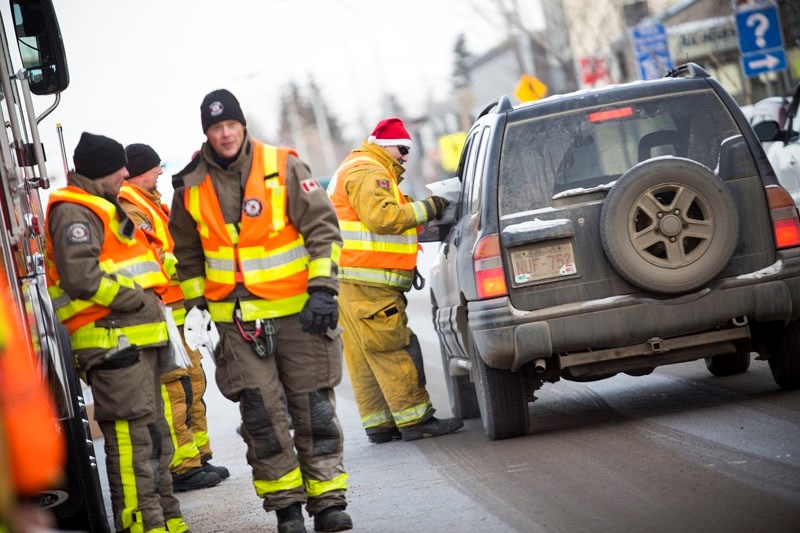Constable Patricia Desmond has one strong memory that fuels her passion to stop drinking and driving and yet it isn't easy for her to talk about it.
“Why do I care so much?” she repeated, after being asked the question by a reporter. “When you watch your 17-year-old brother carry his best friend's casket, who was also 17 and when that 17-year-old lived next door to you ...” she began, and then stopped, as if to catch a breath, as if to catch the tremor in her voice. It was as if she – an RCMP member – could not go on, at least for a few minutes.
The teen who was killed and his family, and her own family were close, she explained. She was a bit older than the boys and so she watched her brother's friend grow up.
“He was a very nice kid.”
That “kid” – that friend, was killed because a drunk and a car full of fellow drunks were playing chicken. The drunk driver's car hit Desmond's friend's car head on. The vehicle was pushed at high speed until it careened off other vehicles and finally exploded and burst into flames.
“They figured he (the friend) was still alive when it caught fire. He died horribly,” Desmond said.
Desmond grieved for the loss of that young friend. She grieved for her own brother's loss and she grieved for the dead boy's family.
“His mother did not get over it. She hardly left the house for two or three years. The thought of his horrible death was too much for her.”
Afterward, Desmond's anger led to her being a 911 responder for some years before becoming a police officer.
“I wanted to stop drunk driving. It's one reason I became a Mountie. I wanted to get drunk drivers off the road,” she said.
Her young friend's death was just the first time that she experienced grief because of drunk driving, she said.
“The son of a guy I worked with was hit by a drunk driver. He was on a motorcycle and his helmet was ripped off his head. He lived, but he was never the same again,” she said.
Sadly, impaired drivers remain on the road, despite the awareness campaigns, despite the Check Stops and despite the reporting of horrific accidents that are seen in all the media.
“There are lots out there. We only catch a portion of them and they are getting in collisions.”
This season's Check Stops have caught some of them, Desmond said, but at the time of publication, there is no tally on how many have been charged.
Desmond could not say which demographic of people are most guilty of driving while impaired.
“It knows no age boundary,” she said, adding that the only difference she has noticed is that older drivers tend to be caught more often in the daytime and those younger than 50 are caught at night.
Alcohol is not the only impairment she has seen. This year during a Check Stop a driver was deemed impaired because he was high on prescription medications, including the pain-killer Percoset.
“He was up and down and all over the place. He was between the lanes. He wasn't signalling. He couldn't focus his eyes. His behaviour was erratic,” the officer said.
She has stopped people high on street drugs, including youths and seniors.
“A few years ago there was a man, who was in an accident in St. Albert, in his 70s, who was on a cocktail of medicines, and drugs, including cocaine.”
At Check Stops, and also at accidents, Desmond uses her nose as the first clue to impairment. Drivers are asked if they have been drinking and as she talks to them, she smells.
“Marijuana is the one we catch most often because it has an odor. Some of the other drugs are more difficult. If they say they have been drinking, or if they have open liquor beside them – which happens – or if there is reasonable suspicion they have been drinking I ask them to provide a roadside breath sample.”
If the driver fails the test, they are taken back to the RCMP detachment where they must provide two more samples. If they refuse a breathalyzer test they can be charged and face the same penalties.
“They are charged with refusal and if found guilty the penalty is the same as if they were impaired,” Desmond said.
The law and the courts will deal with the impaired drivers as they must but sometimes Desmond wishes the penalties were harsher.
“At times, when someone is injured or killed, yes I wish there were harsher penalties. I wish the penalties were harsher for multiple offences too. If they didn't learn the first time and they re-offend, the penalty should be harsh,” she said.
As a young woman she attended a funeral for her brother's best friend. As an RCMP officer she has witnessed the results caused by drunk driving and for Desmond, the pain caused by those impaired drivers is often present.
“A life is taken. A life is destroyed because of drinking and driving,” she said.




